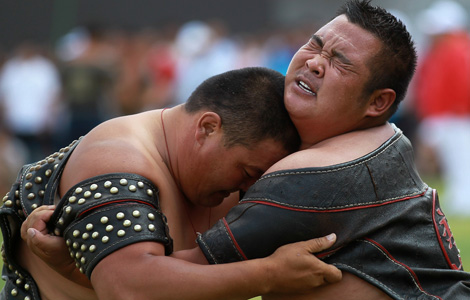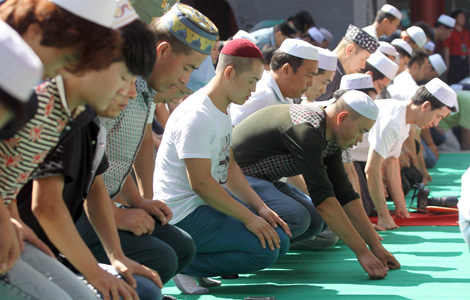Sign of a dangerous obsession
Updated: 2013-08-09 09:31
(China Daily)
|
||||||||
The war-obsessed Japanese militarists' fetish for warships at the start of the last century prompted the country to build more than 20 carriers and giant battleships. These vessels became the catalysts for their imperialist aggression, which dragged the innocent Japanese people into the abyss and inflicted tremendous pain on Japan's Asian neighbors.
Japan is currently limited to self-defense and is banned from operating in overseas combat zones under the Constitution adopted after its surrender at the end of World War II.
But Abe and his supporters want to change this, and they are already laying the groundwork.
A defense paper released in July called for an increase in the country's military capabilities and a more assertive role in regional security to meet what it called the growing threats from China and the Democratic People's Republic of Korea. And Abe supporter Ichiro Komatsu is now heading the bureau that provides legal advice to the cabinet, signaling that Abe now has changes to the Constitution firmly in his sights.
From Abe's rejections of the historical facts about Japan's past aggression to his proposal to change Japan's pacifist Constitution, the words and actions of the administration have become increasingly dangerous, and there is no sign of it attempting to get back on the right track. Deputy Prime Minister Taro Aso, who attended the launch ceremony for the Izumo in Kanagawa prefecture, even said Japan could "learn the technique" Nazi Germany used to change the Weimar constitution. Instead of resigning as other Japanese parties demanded, Aso attended the warship's launch ceremony.
The words and actions of Abe and his supporters have stirred strong indignation and protest in neighboring countries and also evoked the condemnation of the international community. An editorial published in the French newspaper Le Monde advised Abe not to cross the line and called his remarks denying Japan's past aggression "unforgivable". Recently, United States' officials have also expressed their concerns about the militaristic stance Abe has taken.
The atomic bomb dropped on Hiroshima 68 years ago is estimated to have killed about 140,000 of Hiroshima's 350,000 population, including those who died later from radiation. Many others suffered from long-term sickness and disability. The Abe administration has commemorated the dead and injured in a way that has shocked the world.
The Abe administration should never forget the so-called military exploits of the original Izumo were built upon the millions of skeletons of those who died as a result of Japan's military ambitions. The ship itself was sunk by a US air attack on July 24, 1945. It should have been left in the past along with Japanese fascism.
Xinhua-China Daily
Most Viewed
Editor's Picks

|

|

|

|

|

|
Today's Top News
US realty market 'connects dots' with China buyers
Pharm giant suspected of bribery
Economic prospects improved
Beijing rejects protest over patrol
China Unicom tests 4G network
Switching tactics in ambitious new move
Rare earths on shaky ground
More young adults living with parents
US Weekly

|

|













